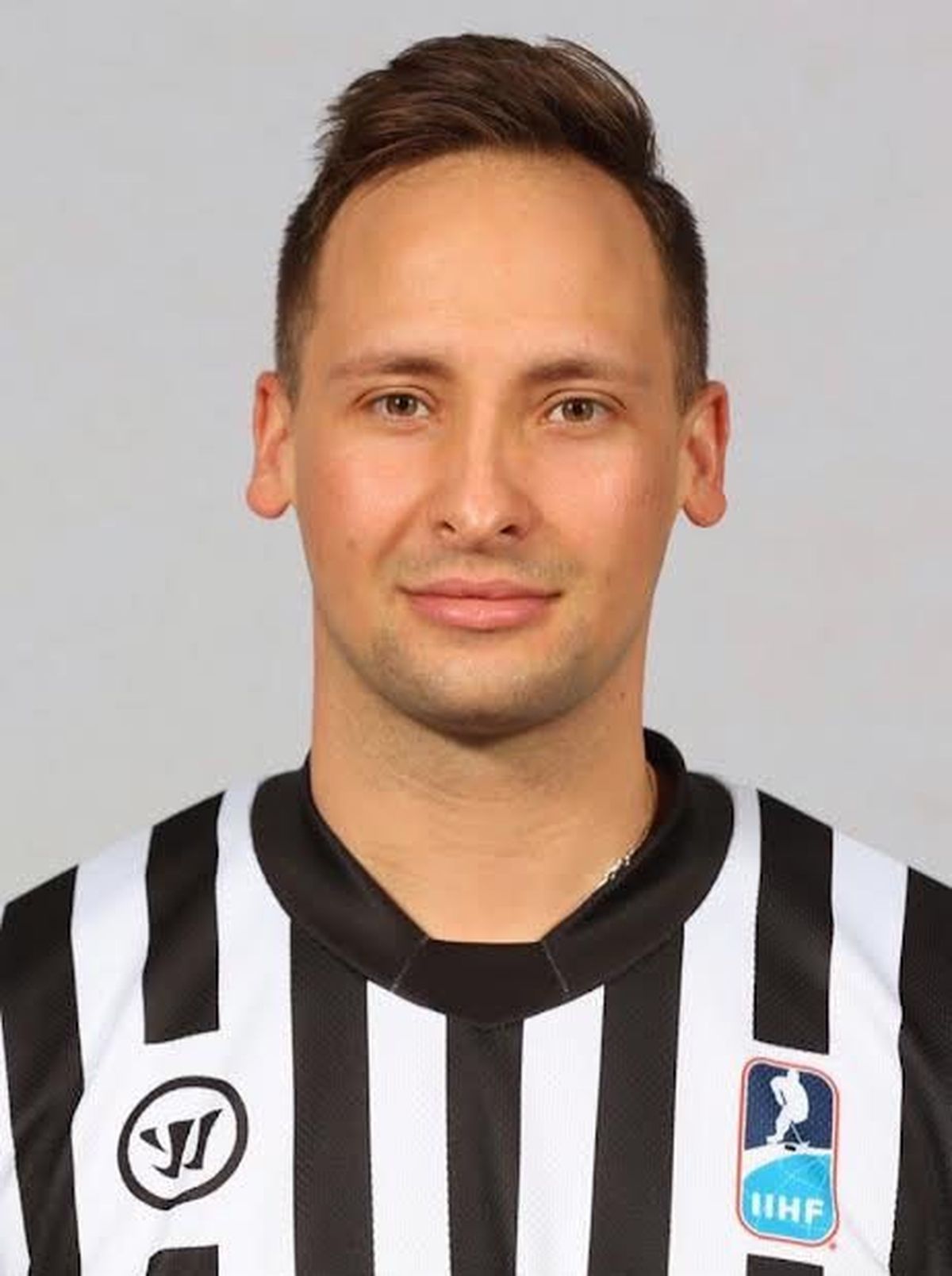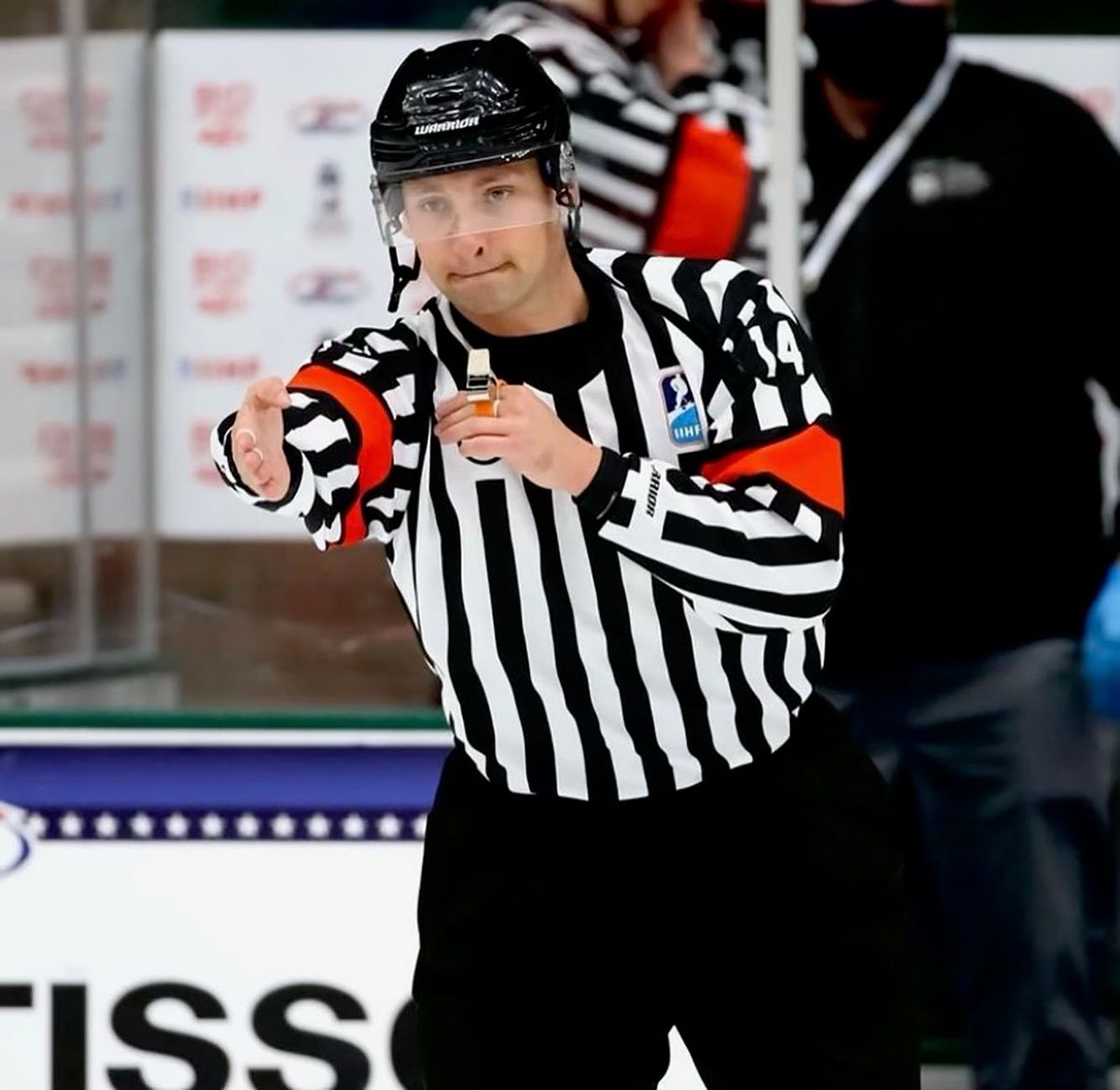‘They are ruthless to refs’: Spokane native Sean MacFarlane officiating world championship tournament in Finland
Spokane native Sean MacFarlane has become an experienced hockey referee in Europe (Courtesy)
As a hockey official, Sean MacFarlane is accustomed to skating with talented players: He has worked in a variety of American leagues and last season refereed in the top professional league in Germany, where many players are either trying to get to the NHL or have played in it previously.
But working games at one of the most prestigious international tournaments – as he has been the past week in Finland – is perhaps the pinnacle of his 12-year career.
“These rosters are just stacked with NHL talent, NHL all-stars,” Spokane native MacFarlane said this week from Tampere, about two hours north of Helsinki.
“The first period of my first game, I was in the corner with the puck and I was like, ‘This is a lot quicker than I am used to.’ My legs weren’t ready for that.”
This week, MacFarlane refereed games at the International Ice Hockey Federation World Championship in a group that includes Latvia, Sweden, the Czech Republic and host Finland. The games have been intense, he said, good ones with active crowds.
His short-term goal is to make the cut and work past the quarterfinals, when the number of referees at the event is trimmed from 16 to eight. After that, he said he’d like to be asked to work on the last day, either in the championship or third-place game, which will be held on May 29.
Within the sport, the IIHF Worlds are a big deal, especially in Europe, for fans and players.
Many NHL players – whose teams aren’t still alive in the Stanley Cup playoffs – are on their home nation’s rosters. Spokane’s Derek Ryan, for example, is competing in playoff games for the Edmonton Oilers, but he has played in Worlds twice before for the United States.
Being chosen as an official at the event is also notable to referees, and for MacFarlane it marks the latest step in what he hopes will be a long career as a referee.
Growing up in Spokane, MacFarlane – now 30 – played youth hockey but realized early that he probably had better career prospects as a referee.
“My goal growing up was to make the NHL as a hockey player, but I’m a 5-foot-9 goalie,” he said. “I wasn’t going anywhere.”
When he was 12, he started officiating youth games. It meant easy money and more ice time, so MacFarlane figured, why not?
That led to more opportunities as he got older, and when he turned 19 he moved to Minneapolis and for eight years worked in leagues all over the Midwest. USA Hockey helped pay his expenses, he said, and a career began.
It’s not for everyone, though.
MacFarlane spends plenty of nights in hotels. He’s not married, doesn’t have children and said he definitely couldn’t live this lifestyle if he did.
Denny LaRue, a former NHL referee who has trained officials in some capacity for more than 30 years, has mentored MacFarlane since he was a teenager. Certainly, LaRue said, a referee needs to have “thick skin” to handle the criticism from all parties involved.
But they also need to be self-reflective, LaRue said.
“I think that’s just an incredibly important trait,” LaRue said. “You have to have confidence, but you also have to have a real ability to reflect inwardly on what it is you’re doing, whether that comes from teams, coaches or evaluators.”
LaRue, who lives in Spokane, has worked with USA Hockey for years and praised the way it mentors young referees such as MacFarlane. He said MacFarlane has worked his way up through the system just as it is designed.
“Sean’s a perfect example of a guy who followed every step along that way,” LaRue said.
He has also been recognized along the way. At the end of the East Coast Hockey League’s 2020-21 season, MacFarlane received the Ryan Birmingham Memorial Award, which honors an on-ice official for his contributions and dedication to the league officiating staff.
A big part of the job is building good working relationships. In Germany, MacFarlane has developed those with players and coaches, which he said helps him do his job better by building mutual respect.
He said he is building that rapport with players in Finland.
For example, Sweden’s captain Oliver Ekman-Larsson was irked – he slung a number of profanities about it, MacFarlane said – when MacFarlane and his partner didn’t call a high sticking penalty in a game over the weekend. That led to a conversation, and ultimately Ekman-Larsson apologized for taking his language too far.
That’s not necessarily a conversation MacFarlane would have been comfortable having when he was younger.
“Whether that’s from age or experience, it helps a lot,” MacFarlane said. “To approach a guy like Oliver, who is an all-star player (for the Vancouver Canucks), one of the best in the world (and to say to him that) the job we’re doing tonight, there’s nothing wrong with it, and you just need to play hockey and not focus on what I’m doing.
“We’re just normal people.
“Players want the right call, just as much as me. The higher you get, the better hockey you get to, the more they respect you, and instead of abusing you and screaming, they will just ask for your reasoning and what you saw. Once you give them the answer, whether they agree or not, they’re professionals and they move on.”
MacFarlane hopes to continue working in Germany and then to be given the opportunity to work in the Milan Olympics in 2026.
He said working the NHL probably isn’t on the table, as the league has shifted its focus to recruiting former minor pros or major junior players, neither of which describes MacFarlane.
But he enjoys working events like the IIHF and also likes being in Germany. He doesn’t speak much German, though he is trying to learn some. But there is a perk to MacFarlane’s present ignorance: While the hockey players all generally speak English, the fans tend to stick to German.
“They are ruthless to refs,” he said. “It’s kind of nice not knowing what they are saying.”




